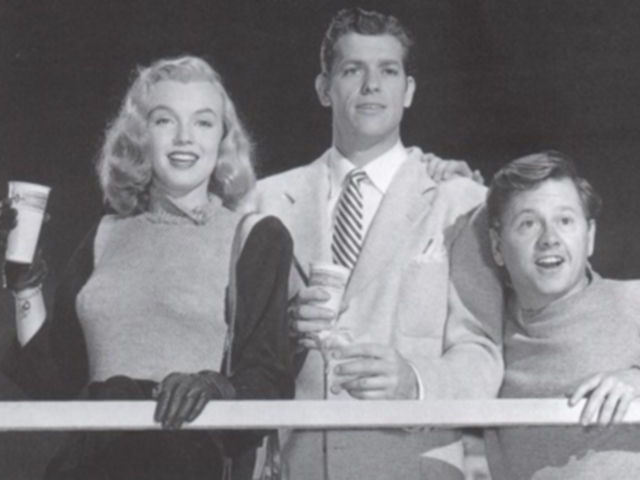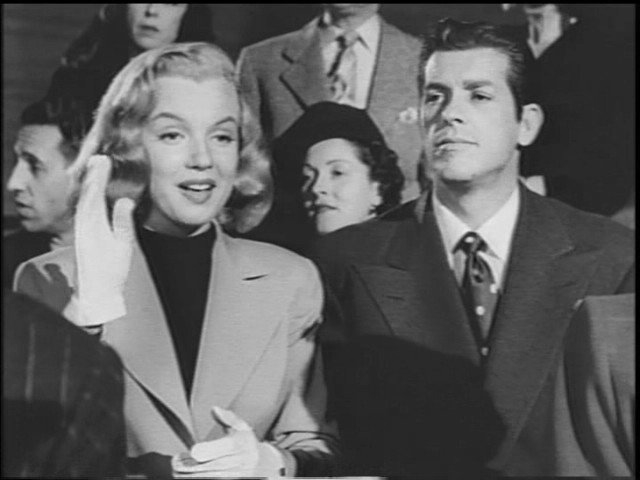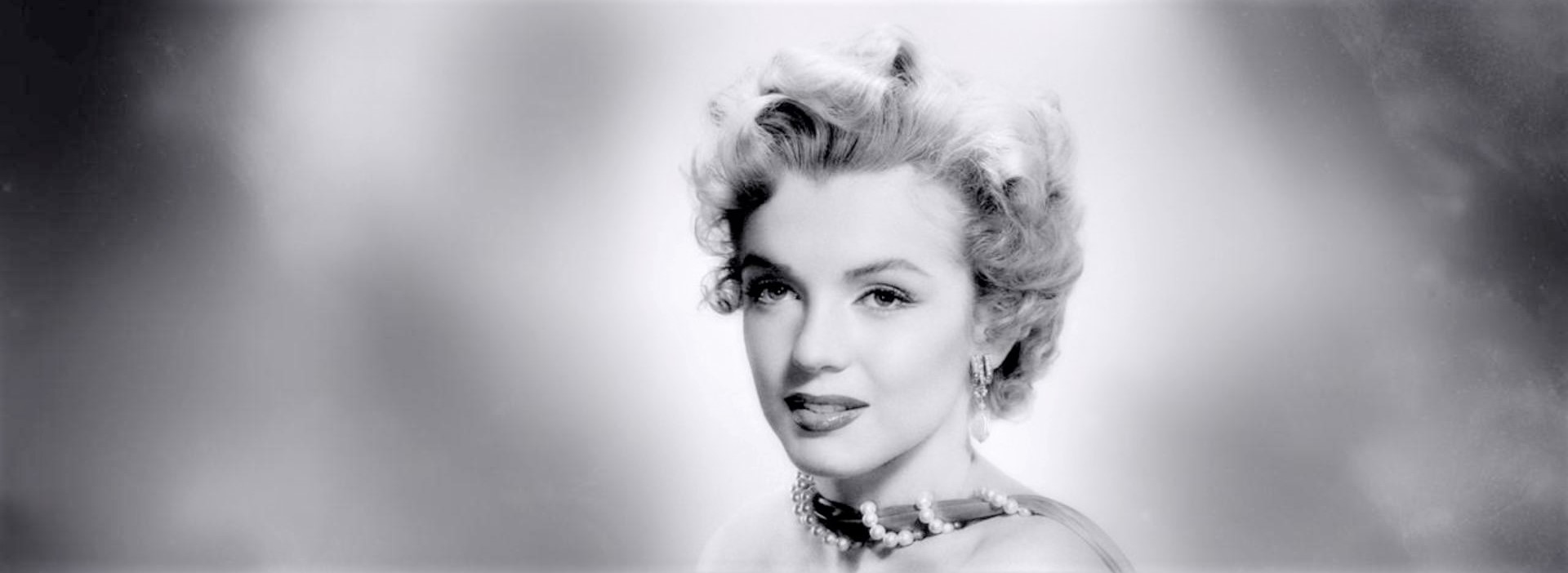The Fireball
7 October 1950
Marilyn with a Skating Champion
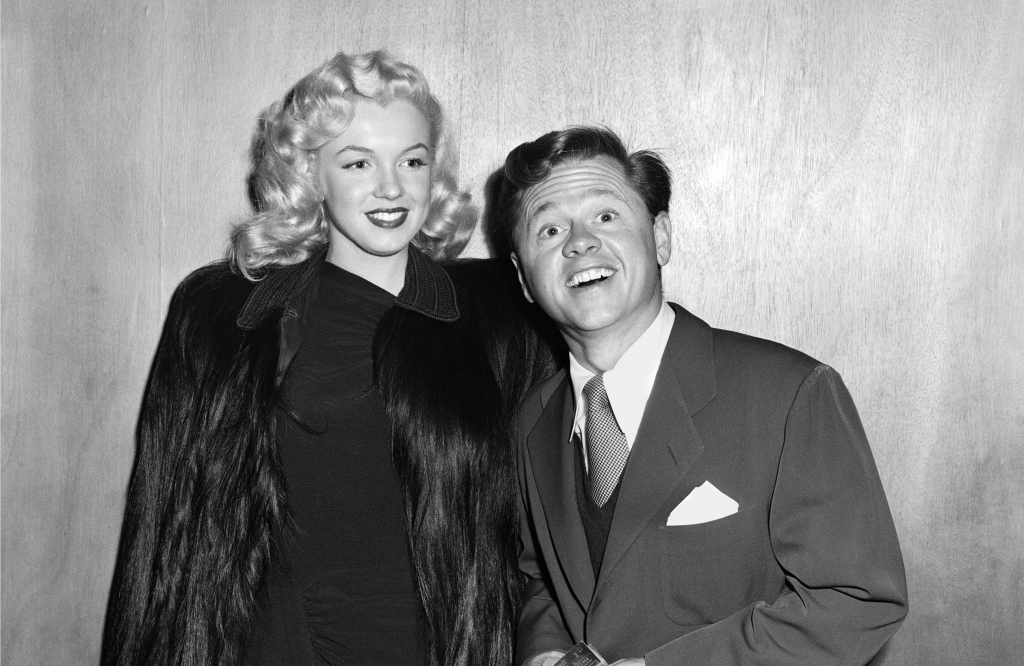
Skater Johnny Casar, the character portrayed by Mickey Rooney in The Fireball, was apparently based on one real person, possibly two. On May the 17th in 2007 on IMDb’s website, Jerod Poore posted the following comment about The Fireball:
I’m one of the sons of the man on whose life this movie is based. Here are a few points that were different in the picture: My father skated under the name Eddie Cazar. One of his teammates was Johnny Cazar. If this movie is a hybrid of the two Cazars’ lives, someone will have to fill in the details on Johnny.
Mr. Poore stated that his father was not an orphan but opined that Johnny Cazar might have been parentless. Apparently neither Eddie nor Johnny were actually as small in stature as Mickey Rooney; and Mr. Poore asserted that the treatment of polio, a serious disease, was not very accurate in the movie. He wrote:
The extent of the polio was seriously downplayed, which is the entire freaking point of the movie! Polio was a big deal back then, and they really gloss over it. It really belittles my father’s struggle and accomplishment … it makes his comeback for one final season of skating all the less spectacular. In a way my father was the Earvin Johnson of the era, having the illness everyone feared the most, yet managing to fight back and still participate in a hugely popular sport … Real life is a lot more complex than reel life. His fall a lot harder, his climb up a lot harder, his triumph a lot more amazing, but it took a hell of a lot longer for redemption. So do check out this movie, it is a glimpse into a nearly forgotten popular culture and plague. Even if it is a watered down look into one man’s life or two men’s conflated lives.
Mickey Rooney starred in another movie featuring a small, hard-nosed orphaned boy, 1938’s idealized but inspirational biopic about Father Edward J. Flanagan and his Boys Town. But Mickey’s appearance in each movie is the only similarity between Boys Town and The Fireball. Nominated for five Academy Awards, Boys Town won two, Best Actor for Spencer Tracy, who portrayed Father Flanagan, and Best Writing for Elanore Griffin and Dore Schary. The Fireball did not receive any Academy Award nominations.
Mickey plays Johnny Casar, a pugnacious orphan who is headed in the wrong direction, according to Father O’Hara, the Irish priest who manages the orphanage where Johnny lives. The good father, played by the one and only Pat O’Brien, realizes that Johnny’s problem stems from his small stature and an inferiority complex. The priest believes that Johnny might benefit from some therapy. Even though Johnny agrees, he runs away to avoid it and finds himself walking the streets.
As fate would have it, an automobile backs into a curbside trash can that happens to contain a pair of sidewalk roller skates. Once freed from the trash, the skates roll right up to Johnny’s feet and, as fate would have it again, they are an exact fit. Skates attached, he heads off, down a sloping sidewalk, out of control. Eventually he comes to rest at the feet of a restaurateur, Bruno Crystal, played by Ralph Dumke. Bruno is a kind fellow and befriends the orphan. He also directs Johnny to the Palamar, a nearby skating rink that will change Johnny’s fortunes.
At the Palamar, Johnny meets roller derby champions, Mack, played by Glenn Corbett, and Mary, played by a sweet faced Beverly Tyler. Even though he is at the Palamar to instruct amateurs, Mack has little patience with them and he treats Johnny unkindly: they become the best of enemies. Even so, Mary decides to instruct Johnny. She also becomes a dependable friend and invites Johnny to attend the opening of roller derby season, which he does, and heckles Mack. This heckling causes a sensation and Johnny becomes an oddball celebrity. The local television station that broadcasts the roller derby matches interviews Johnny one night during half time. This interview results in a newspaper article, telephone calls and a picket line, all demanding a match race between Mack and Johnny.
At first, Mack refuses the challenge: he is the champion, after all. Eventually, Mack relents. Jeff Davis, played by Milburn Stone, owns the roller derby team and the track and he intends to milk the suddenly popular rivalry for all the money he can, scheduling rematch after rematch. At first, Johnny is easily defeated by the more experienced skater; but with each successive race, and some additional private instruction by Mary, Johnny improves and finally defeats Mack.
In what must be one of the goofiest scenes in the history of sports movies, Johnny announces with arrogant confidence that he is going to join the team, call the shots and all his teammates are going to do what he demands. Johnny makes his strange announcement after only one victory over Mack and just because the arena crowd is chanting his name. No one objects, not even Jeff. Now, I realize we are talking about roller derby here; but even so, I doubt that such an announcement by an amateur would be greeted with the kind of passivity displayed by Jeff and his team. Also, I’m a little incredulous that rising to roller skating fame and glory could happen over so short a length of time. Not impossible, I suppose; I’m just doubtful.
At any rate, Johnny joins and travels with the team from city to city, Denver, Detroit, Chicago and many others. He becomes a big star, the Fireball, highest roller derby scorer of all time and Athlete of the Year. He also becomes an egocentric lout who treats friend and foe alike: shabbily. Johnny’s behavior becomes much worse than Mack’s ever was. Johnny only cares about himself, has absolutely no regard for his teammates or his opponents. He becomes a dirty and dangerous skater. Jeff tells Johnny: All your teammates hate your guts. So what. Johnny doesn’t care.
Soon, Johnny begins to perspire excessively and show signs of fatigue before and during matches. One night, after causing a pile-up of many skaters, Johnny is unable to get to his feet. At the hospital, the diagnosis is polio. Perhaps the most interesting and compelling aspect of the movie is its depiction of the debilitating effects of polio on the human body, and the fact that Johnny was able to recover from that terrible disease and return to skating speaks to the tenacity of the skater and his refusal to admit defeat. In spite of his often ugly behavior, one has to admire his iron will and resolve. An arduous journey of two years battling the ravages of that terrible disease awaits Johnny but he succeeds. With the help of Mary, Father O’Hara, the doctors and nurses and the physical therapists, Johnny triumphantly returns to skating and roller derby.
At first, Johnny is a changed man, humbled by his experience with polio. But even before he skates in his first match, when he hears the crowd begin to chant his name, the old arrogance returns. Father O’Hara asks Johnny to help out a young teammate, who is very much like the young Johnny. The priest believes that the youngsters future may very well hinge on how he performs in the match. If he could score once or twice, suggests Father O’Hara. Johnny refuses which angers the priest. It must be a pretty frightening thing, Father O’Hara tells Johnny, when a man can work himself into a spot where nobody cares if he lives or dies. And, Johnny, it looks like you’ve just about made it. Once on the track, after some preliminary showboating, Johnny reconsiders and helps the young man score a point. Father O’Hara is happy and relieved and as he glances skyward, says to God: Thanks. For a minute I was afraid You were looking the other way.
We never learn how Johnny’s generosity helps his young teammate, if at all, because the movie ends, having achieved the requisite point of smiles and a joyful resolution.
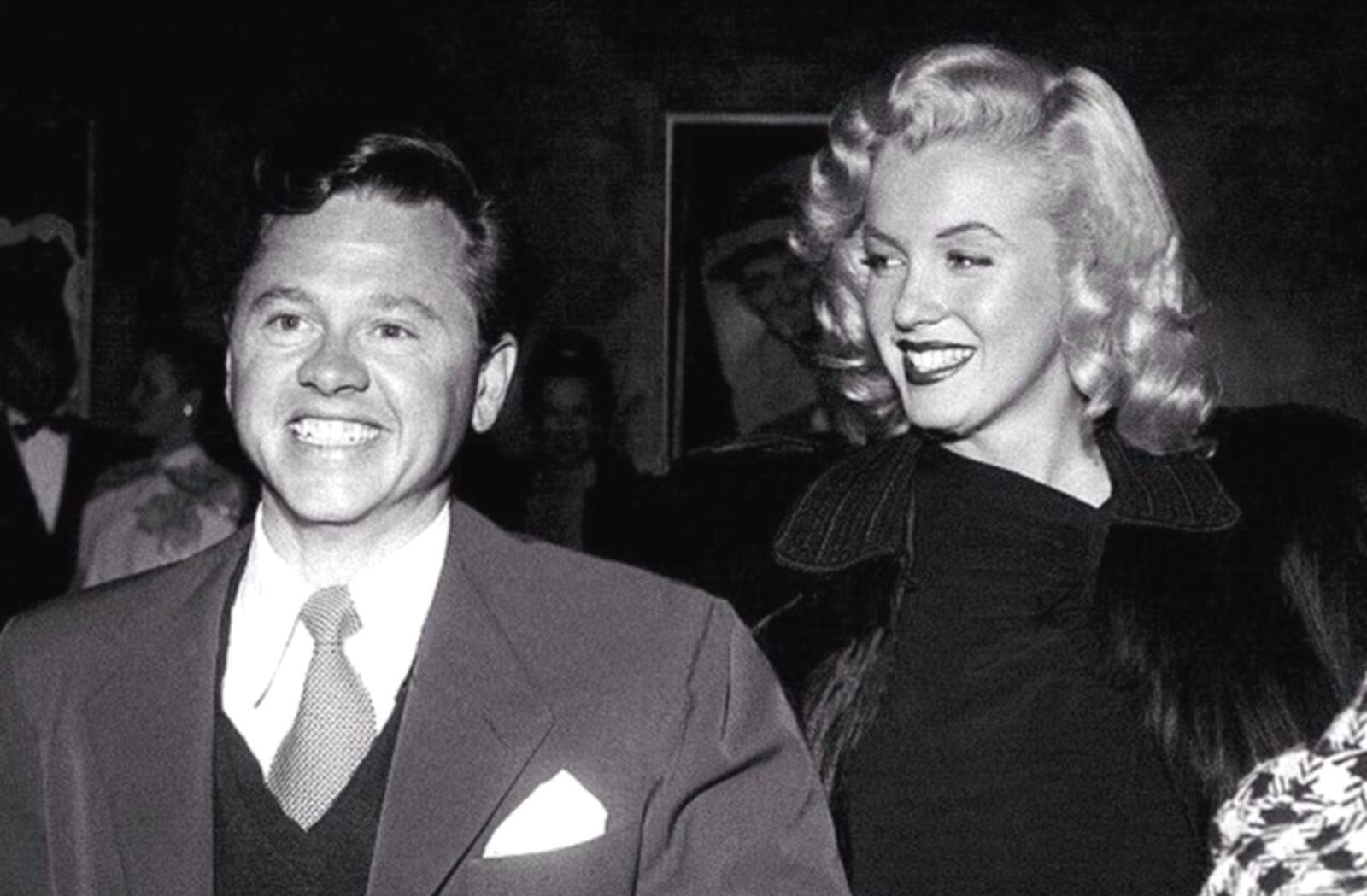
Made quickly and cheaply, The Fireball was designed by its producers to take advantage of the roller skating and roller derby crazes that spread across the United States and the world during the late 1940s. Slightly successful, what actually resulted from the producer’s design is a slightly better than average, low budget melodrama featuring better than average performances by a better than average cast. Their performances elevate what would otherwise be a C movie with a slightly hackneyed plot and relatively dull dialogue to the level of a B movie with a slightly hackneyed plot and relatively dull dialogue.
Although Pat O’Brien is not on screen that frequently, since his role is a supporting one, when he is on screen his presence pulls focus. He is, after all, the quintessential hard-nosed tough-loving Catholic Priest when he’s not at Notre Dame being Knute Rockne, the legendary Notre Dame football coach, who O’Brien portrayed in the 1940 biopic, Knute Rockne, All American. O’Brien also appeared with Marilyn in Billy Wilder’s Some Like It Hot as the hard-boiled policeman, Detective Mulligan.
Beverly Tyler’s performance as Johnny’s wholesome girlfriend, Mary Reeves, is endearing and very believable but her romantic interest in Johnny is a bit bewildering: she’s as sweet as Tupelo Honey and he’s like a persimmon. I realize that women often make allowances for men. Otherwise, how does one explain the oddities of certain weird relationships.
Glenn Corbett as the skating champ, Mack Miller, is appropriately abrasive and arrogant but even so, he’s not unlikable. In fact, I found myself feeling a little sympathy for Mack. At the start of the movie, he was a little rough with Johnny, for true; but not nearly enough to warrant the kind of assault Johnny levels at him. Mack’s reaction to Johnny’s unkind derision is certainly understandable.
Milburn Stone delivers a convincing performance as the roller derby franchise owner, Jeff Davis, who wants his team to perform well and win while observing normal rules of athletic and competitive decorum. That he grows weary of Johnny’s egoism and dangerous disregard for his team and his teammates is not surprising. The amount of anger and disgust that Milburn displays for Johnny is just about right. Milburn Stone also appeared as Doc Adams on the television western, “Gunsmoke”, which aired for twenty seasons, from 1955 until 1975, and was the longest running weekly series in television history until tied for that distinction in 2010 by “Law and Order”. “Gunsmoke” aired 635 episodes while “Law and Order” aired only 456. Milburn also appeared as a wounded American fighter pilot, Captain Pat Vickery, in the 1943 Sherlock Holmes movie, Sherlock Holmes Faces Death, starring Basil Rathbone and Nigel Bruce.
And last but not least, as good as the other actors are in their roles, the movie is carried by Mickey Rooney and his portrayal of the pugnacious and tenacious orphan, Johnny. Mickey was thirty years old when The Fireball was filmed. I’m not sure what age he is suppose to be, an older teenager perhaps. I point that out not as an indictment but in order to say that Mickey brings the sensibility of a thirty year old man to his portrayal of Johnny, along with the vast experience of his then twenty-eight year career in motion pictures. Mickey and the camera were not strangers.
Mickey Rooney was an amazing movie star. His career started in 1924, spanned a remarkable 90 years and he appeared in over three-hundred movies. The longest career in the history of the silver screen ended with his death in 2014; and with his death, silent movie stars also passed into extinction. Sir Laurence Olivier called Mickey the greatest actor of them all and Clarence Brown, who directed him in National Velvet and The Human Comedy, said that Mickey was the closest thing to a genius I ever worked with. Critic David Thomson considered Mickey’s performance as Puck in A Midsummer Night’s Dream to be one of cinema’s most arresting pieces of magic. Mickey was a mere thirteen years old at the time.
Mickey’s performance as Johnny Casar is a testament to his acting skill. He never loses control of his character and always displays the right combination of cocksure bravado and diffidence in a person of small physical stature trying to overcome unpleasant feelings of inferiority. One assumes that Mickey knew those types of feelings intimately. Not unlike the character he portrays in The Fireball, Mickey overcame many obstacles during his long life and career but he never surrendered. Alas, he was married eight times. That alone would wither most regular sized men. And even though his movies, over the years, earned millions and millions of dollars, when he left Planet Mearth, he was all but bankrupt. Odd how that seems to happen to quite a few denizens of the City of Angels.
Some reviewers accuse Mickey of over-acting from time to time and my response to that accusation is this: the only movie in which Mickey didn’t overact was The Black Stallion, made nearly thirty years hence. Besides, saying that Mickey Rooney over-acted is like saying Jesus over-preached.
The Fireball was yet another turn as uninteresting window dressing for Marilyn. Her character, Polly, is nothing more than an arm ornament for a wealthy young man who is a fan of Roller Derby and Johnny. She has little or no opportunity to act. Some reviewers suggest that she and Johnny were sexually involved; but I don’t see any evidence in the movie to support that conclusion. Polly ridicules Johnny’s arrogance and self-importance when he attends the party thrown by her boyfriend. From the evidence in the movie, I conclude that she actually dislikes Johnny but merely tolerates him to placate her wealthy and handsome boyfriend.
One might wonder why Marilyn accepted such insignificant roles? Well, because she had no choice. Her next role, however, would build on the impressive reviews she received for her portrayal of Angela Phinlay in John Huston’s The Asphalt Jungle. She would soon be sharing the screen and stealing scenes from George Sanders, Anne Baxter and Bette Davis in the Joseph Mankiewicz directed, female drama, All About Eve.
